THE
ELDERCARE
QUESTIONS
EVERYONE
SHOULD ASK
L ITA E PSTEIN, MBA

Avon, Massachusetts
Copyright 2009 by Lita Epstein
All rights reserved. This book, or parts thereof, may not be reproduced
in any form without permission from the publisher; exceptions are
made for brief excerpts used in published reviews.
Published by Adams Business, an imprint of Adams Media,
a division of F+W Media, Inc.
57 Littlefield Street, Avon, MA 02322. U.S.A.
www.adamsmedia.com
ISBN 10: 1-59869-890-7
ISBN 13: 978-1-59869-890-9
eISBN: 978-1-44052-007-5
Printed in Canada.
J I H G F E D C B A
Library of Congress Cataloging-in-Publication Data
is available from the publisher.
This publication is designed to provide accurate and authoritative information with regard to the subject matter covered. It is sold with the understanding that the publisher is not engaged in rendering legal, accounting, or other professional advice. If legal advice or other expert assistance is required, the services of a competent professional person should be sought.
From a Declaration of Principles jointly adopted by a Committee of the
American Bar Association and a Committee of Publishers and Associations
Many of the designations used by manufacturers and sellers to distinguish their products are claimed as trademarks. Where those designations appear in this book and Adams Media was aware of a trademark claim, the designations have been printed with initial capital letters.
This book is available at quantity discounts for bulk purchases.
For information, call 1-800-289-0963.
CONTENTS
INTRODUCTION
Talking about financial and legal issues with our parents will be hard. Previous generations were taught to keep their financial and legal issues private. In addition, they may have difficulty accepting the reversal of roles when we become the decision-makers out of necessity.
Hopefully, your parents will never need you to be the decision-maker, but you cant count on that. Planning for the possibility that your parents or other family elders will become incapable of making financial and legal decisions will make it much less painful to deal with if the need arises.
There are many financial, medical, and legal documents that can be put in place while your elders are still able to make decisions that will ease the burden for all later. In this book, Ill introduce you to the key documents you should prepare and other things you should do to be sure that you are ready if the time comes when you must make the decisions for your parents or other family elders.
Chapter
GETTING STARTED
WHAT COMES FIRST?
Question 1: How do I start talking with my elderlyparents?
That depends upon your current relationship with your parents. If you are one of the lucky few who grew up in families in which legal and financial issues were discussed openly, this will be an easy conversation to start. If not, youre in the majority, and youll likely find yourself dancing around the topic as you try to get your parents to open up about their financial situation and what provisions theyve made for dealing with their finances as they age.
Your parents will most likely start by saying its none of your business. Dont keep digging if that happens. Instead, start talking about your concerns and the issues you want to discuss. Begin talking generally about topics such as estate planning and making provisions for emergency medical situations. As you discuss the issues, your parents may open up and start talking about the plans theyve already made. Or maybe theyll ask you for your help to get their plans in place.
If you do not succeed in getting your parents to open up, you may want to contact a local senior center and ask to speak with a counselor or social worker who helps families deal with these issues. Sometimes an uninvolved third party can help get the ball rolling more easily than you can.
Question 2: What are the key topics I need to talkabout?
The key topics you need to talk about fall into three general areas:
 Financial decision-making: Discuss making provisions for handling your elders finances should he or she become unable to do so. In Chapters 3 and 4, Ill cover the basics of what needs to be done to plan for incompetency and what needs to be done after your elder becomes incompetent. In Chapters 6 and 7, Ill discuss the basics of handling your elders budget and managing his or her funds.
Financial decision-making: Discuss making provisions for handling your elders finances should he or she become unable to do so. In Chapters 3 and 4, Ill cover the basics of what needs to be done to plan for incompetency and what needs to be done after your elder becomes incompetent. In Chapters 6 and 7, Ill discuss the basics of handling your elders budget and managing his or her funds.
 Medical decision-making: If your elder is unable to make medical decisions for himself or herself, its best if a family member has been designated as the authority to make those decisions. In Chapter 5, Ill discuss the legal documents you need to have in place so that someone can make medical decisions when necessary. In Chapter 8, Ill discuss dealing with the costs of your elders medical care.
Medical decision-making: If your elder is unable to make medical decisions for himself or herself, its best if a family member has been designated as the authority to make those decisions. In Chapter 5, Ill discuss the legal documents you need to have in place so that someone can make medical decisions when necessary. In Chapter 8, Ill discuss dealing with the costs of your elders medical care.
 Estate planning: Even if your elder doesnt have much money, its a good idea to sit down with an estate planner. Youll ensure that everything is in place to minimize the need for probate and distribute the estate as your elder wants it distributed. Chapters 9 through 11 discuss the basics of wills and probates. Chapters 12, 13, and 14 deal with tax issues. Chapter 15 discusses gifts. Chapter 16 discusses trusts. If there is a family business involved, youll need to discuss the transfer of that business, which Ill cover briefly in Chapter 17. Finally, youll need to think about life insurance, which Ill cover in Chapter 18.
Estate planning: Even if your elder doesnt have much money, its a good idea to sit down with an estate planner. Youll ensure that everything is in place to minimize the need for probate and distribute the estate as your elder wants it distributed. Chapters 9 through 11 discuss the basics of wills and probates. Chapters 12, 13, and 14 deal with tax issues. Chapter 15 discusses gifts. Chapter 16 discusses trusts. If there is a family business involved, youll need to discuss the transfer of that business, which Ill cover briefly in Chapter 17. Finally, youll need to think about life insurance, which Ill cover in Chapter 18.
Question 3: What are the key legal documents an eldershould have in place?
Even if you cant get your elder to discuss estate planning, you must be sure that your elder has several key legal documents in place:
 A will for the distribution of the estate. Ill talk about the importance of a will in Chapter 10.
A will for the distribution of the estate. Ill talk about the importance of a will in Chapter 10.
 A living will that indicates medical choices should your elder be unable to make them. I explain the importance of living wills in Question 33.
A living will that indicates medical choices should your elder be unable to make them. I explain the importance of living wills in Question 33.
 Designation of a medical decision-maker. Ill talk about various options in Chapter 5.
Designation of a medical decision-maker. Ill talk about various options in Chapter 5.
 A durable power of attorney or other legal document that specifies who will be in charge of your elders affairs should he or she become incompetent (see ).
A durable power of attorney or other legal document that specifies who will be in charge of your elders affairs should he or she become incompetent (see ).
Question 4: What key financial planning steps shouldyou take with an elder?
Your first step should be to sit down with your elder and sort out his or her current financial position. You need to look at:
 Bank accounts
Bank accounts
 Mortgages or other loans
Mortgages or other loans
 Credit card accounts
Credit card accounts
 Ownership documents (titles to houses, cars, or other assets)
Ownership documents (titles to houses, cars, or other assets)
 Life insurance policies
Life insurance policies
Next page
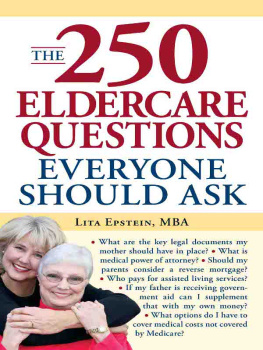

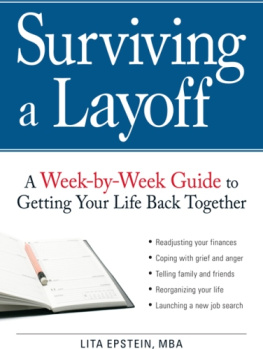
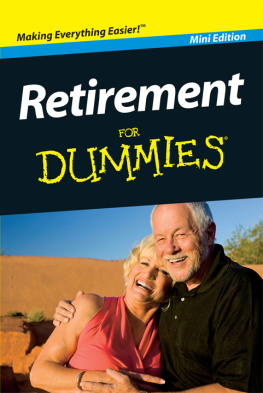

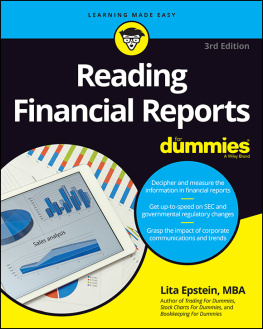

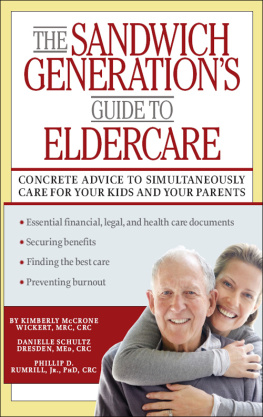

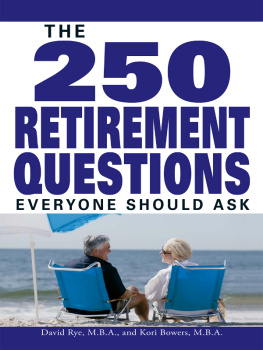
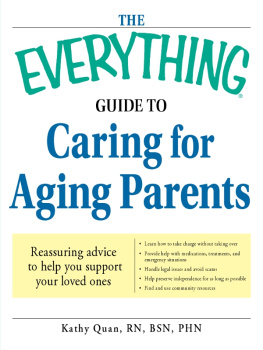
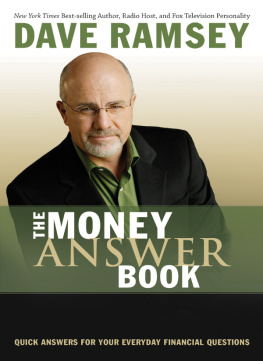

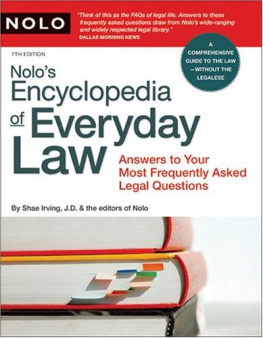


 Financial decision-making: Discuss making provisions for handling your elders finances should he or she become unable to do so. In Chapters 3 and 4, Ill cover the basics of what needs to be done to plan for incompetency and what needs to be done after your elder becomes incompetent. In Chapters 6 and 7, Ill discuss the basics of handling your elders budget and managing his or her funds.
Financial decision-making: Discuss making provisions for handling your elders finances should he or she become unable to do so. In Chapters 3 and 4, Ill cover the basics of what needs to be done to plan for incompetency and what needs to be done after your elder becomes incompetent. In Chapters 6 and 7, Ill discuss the basics of handling your elders budget and managing his or her funds.